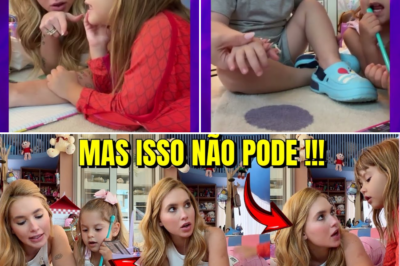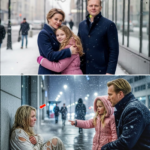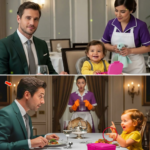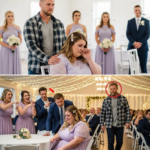
Miguel had seen many children come and go in his years as a first-grade teacher. Some were loud, others quiet, some a little mischievous—but Valeria was different. She was gentle, observant, and always early to class. She sat in the third row, took out her pencil case with kitten drawings, and spent her quiet minutes before class sketching animals with bows in their hair. “They’re happy,” she once said when asked why. “And I want to be a vet when I grow up to take care of them.”
But something shifted.
It began with little things. A long-sleeved shirt in the middle of a heatwave. Drawings left undone. A blank stare that seemed to cut through the noise of the playground. On Tuesday, Miguel noticed her wearing an oversized blouse. On Wednesday, another one—bigger, heavier. Her hair, usually in neat braids, was tangled and loose. She stopped playing with her classmates and spent recess sitting quietly under a tree, legs swinging above the ground, eyes fixed on nothing.
Miguel approached her gently. “Did you bring lunch today?” he asked. She pulled out a bruised apple. “It’s what there was,” she replied with a shrug.
“Everything okay at home?” he asked.
She hesitated, bit into the apple, then whispered, “My dad gets really mad. He yells a lot.”
“And does he scare you when he yells?”
Valeria nodded, almost imperceptibly. Miguel leaned in a little. “Has he ever hurt you?”
She didn’t speak—but she didn’t have to. Her trembling hands and the way she tugged at her sleeves said everything.
Later that week, during an activity about “safe places,” the children were asked to draw somewhere they felt happy. Parks, grandmas’ houses, and sunny rooms filled the pages. But Valeria’s drawing was different. A brown door with red locks. Behind it, a little girl crouched, hands covering her face, surrounded by squiggly lines that looked like noise. “Who is this?” Miguel asked. “No one,” she muttered. “Just my imagination.”
But Miguel recognized the same uneven bangs, the same blouse with flowers she’d worn two days ago.
The next day, Miguel saw it—just for a moment. During recess, Valeria nearly tripped. Her sleeve lifted slightly, revealing a dark bruise just above her elbow. “Valeria,” Miguel said, walking to her calmly, “come with me.”

In a quiet hallway, he crouched down. “I saw the bruise. What happened?”
“I fell off the bed,” she replied.
“That doesn’t look like a fall.”
She clenched her sleeves tighter. “Sometimes I yell. I’m stubborn. It was my fault.”
“It was your dad, wasn’t it?”
Tears welled up in her eyes. “Please don’t call anyone. He’ll get angrier. He says I can’t tell. But he loves me. He just gets mad.”
Miguel nodded. “I won’t do anything today. But if it happens again, I will. I promise, I will protect you.”
That promise would change everything.
The following Monday, Valeria came into class wearing a thick sweater, despite the heat. She was quiet, distant, and avoided eye contact. During class, she barely moved. Miguel watched her, heart sinking. That afternoon, she walked in late, eyes wet with tears, and said words that made Miguel freeze.
“Teacher… my dad did it again.”
He took her hand and led her to the coordination office. As she curled into a corner, silent and shaking, Miguel called the police. “I have a six-year-old reporting domestic violence. Yes, the father. She’s safe now. Please come.”
Just then, the principal, Lucía, burst in. “What are you doing?”
“She said he did it again. She’s crying. I had to call.”
“You’re calling the police over a child’s words? Do you understand the consequences?”
Miguel didn’t answer. He went back to the call.
Thirty minutes later, officers arrived. One knelt beside Valeria. “Can you tell us what happened, sweetheart? You’re safe.”
Before she could answer, the door flew open. A man stormed in, furious, demanding to see his daughter. “What is this circus? That kid lies all the time.”
Miguel stepped between him and Valeria. “You need to calm down.”
“Don’t get between me and my daughter!” he yelled, jabbing a finger in Miguel’s face.
A police officer intervened. “Sir, step back. Any aggression will be treated as resistance.”
Valeria sobbed in the corner, covering her face. Miguel stood firm, heart racing.
That night, the news did not feature the story. There were no cameras, no scandal—just a quiet moment of truth. A little girl who finally said something. A teacher who listened.
And a system forced to face the choice: protect the image or protect the child.
Valeria’s story isn’t just about one child. It’s about every small voice that gets brushed aside, every drawing dismissed as imagination, every “accidental bruise” explained away. Miguel didn’t have all the proof. But he had something stronger—instinct, care, and courage.
He risked his job, his reputation, even his peace of mind. But as he stood there between a broken man and a broken child, he understood: silence had already done enough damage.
Valeria now had someone standing with her.
And that was the beginning of everything changing.
News
Virgínia Rompe o Silêncio Sobre Leonardo no Hospital e Revela Mágoa Que Ninguém Imaginava
A segunda-feira começou tensa para o mundo sertanejo e para milhões de seguidores atentos a cada movimento da família Costa….
Virgínia rompe o silêncio, se recusa a visitar Leonardo no hospital e expõe ferida que vinha crescendo dentro da família
A madrugada de segunda-feira começou diferente. Ainda antes do sol nascer, portais de Goiás noticiaram que Leonardo havia sido internado…
Sumiço de Neymar em Paris e Story de Biancardi Acendem Alerta: Coincidência ou Recado Silencioso?
O silêncio, às vezes, fala mais alto do que qualquer pronunciamento. E foi exatamente esse silêncio que transformou a ausência…
O silêncio de Neymar, o sumiço repentino e a indireta de Biancardi que deixou tudo ainda mais tenso
Tudo aconteceu de forma silenciosa demais para ser normal. Sem anúncio oficial, sem justificativa clara e sem aquela movimentação típica…
O pedido inesperado das Marias para o Natal deixa Virgínia sem reação e derrete a internet
O clima já era de festa, casa cheia, risadas espalhadas pelos cômodos e aquele barulho gostoso de família reunida quando…
O Pedido de Natal das Marias que Deixou Virgínia em Choque e Derreteu a Internet
O Natal ainda nem chegou, mas um momento simples dentro de casa foi suficiente para emocionar, arrancar risadas e surpreender…
End of content
No more pages to load









